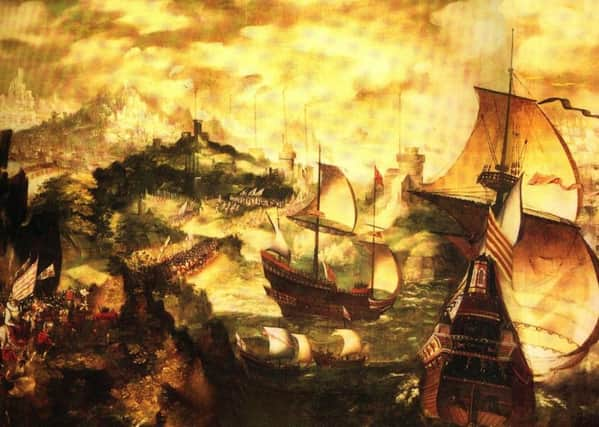Nostalgia:


Invasions by foreign enemies, successful or disastrous, have left a deep and lasting impression on the English memory: they have become the stuff of legends. But none has resonated more than the defeat of the Spanish Armada. Historically, it ranks with the repulse of Hitler’s Luftwaffe in the summer of 1940.
Even today, when the nation has become fairly equally divided between those who believe that we can and should stand alone, proud and powerful still, and those who are convinced that our destiny is inside, not outside, the European continent, 1588 remains a marker, a moment of patriotic, self-assurance.
Advertisement
Hide AdAdvertisement
Hide AdThe best-known legends can be swiftly dismissed. If Francis Drake did say that there was plenty of time to beat the Spaniards after they had finished their game of bowls, it would have been characteristic of the hard-bitten pirate, who is still demonised in Spain. In fact, however, the English galleons were then penned into Plymouth Sound by a westerly wind. They would have lost the weather gauge on the Armada if they had tried to put to sea immediately. Later, far from defeating the Armada, Drake foolishly and selfishly broke formation to capture a disabled ship himself.
Elizabethans then and now always quote the Queen’s speech to her troops at Tilbury:
“I am come amongst you...not for my recreation and disport, but in the heat of battle to live and die amongst you...and scorn that Parma or Spain or any price of Europe should dare invade the borders of my realm...”
No commentator has ever doubted the strength and effectiveness of Elizabeth’s words or her courage in delivering them, yet very few have pointed out that they were made when it was already known that the Armada had been scattered by English fireships at Calais, pummelled by English cannon off Gravelines, and sent fleeting northwards up the Scottish coast out of harm’s way. In other words, without a naval escort, Parma’s army was stuck at Dunkirk. There would be no invasion.
Advertisement
Hide AdAdvertisement
Hide AdAs for some of the other silly stories in circulation, readers might judge for themselves whether Herdwick sheep in Cumbria are descended from Spanish shipwrecked survivors; whether Fair Isle sweaters are modelled on the colourful dress of the crew of El Gran Grifon; or whether some Irish have Iberian ancestry. The last seems especially improbable, since the natives of Connaught butchered a thousand men and boys who were washed up on their shores.
There remain two worthwhile questions to answer: why was the Spanish invasion thwarted? And why did it matter then and to us now?
Strangely to most of us, both England and Spanish contemporaries believed that God had decided the outcome. Even Francis Drake, never guilty of modesty, attributed the English victory to “the mightie providence of God”. And English medals struck to commemorate the defeat of the Armada declared that God had blown with His winds and scattered His (?) enemies.
If there was one earthly being who deserved most of the credit it was Sir John Hawkins. Since his appointment in 1577 as treasurer of the Royal Navy, and based on his long experience as a privateer in Atlantic waters, Hawkins had re-designed and re-equipped a fleet of new galleons. Longer, narrower and faster, they carried many more heavier, long-range cannon than their predecessors. Whereas Philip’s ships were mostly troop-carriers for close combat, Hawkins built galleons, “apt and nimble vessels”, which were essentially gun-carriers.
Advertisement
Hide AdAdvertisement
Hide AdAlthough Spanish discipline and tight formation and English indiscipline produced a stalemate up the Channel from Plymouth to Calais, after the Spaniards lost their cohesion they were out-gunned and out-manoeuvered off the sand dunes of Gravelines.
On the Spanish side, overwhelmingly the blame lay with Philip II. None of his captains, at sea or on land, neither Medina Sidonia nor the Duke of Parma, believed that they could beat the English in battle in their seas. As one naval commander wrote, “only a strange freak of weather” and “God’s cause” could save his ships from being “knocked to pieces with their culverins [heavy cannon]”.
Secondly, Philip never worked out how the Armada could meet and then escort Parma’s soldiers safely across the Channel. He never seems to have accounted for the inability of deep-draught transporters to operate in such notoriously shallow seas off the Flemish coast. And he seems to have discounted the presence of Dutch warships in these dangerous waters.
What did it matter? With the handicap of hindsight, we know that, despite Philip’s intentions, no more Spanish Armadas reached England’s shores, even though that of 1588 was only the first of many later attempts. The war dragged on until 1604, outliving both Philip and Elizabeth. If Spain could not conquer England, England could not hope to bring the world-wide Spanish empire to its knees. Just as in 1940, if Hitler could not subdue Britain, the British alone had not the power to defeat the Third Reich and liberate Europe.
Advertisement
Hide AdAdvertisement
Hide AdLooking at the situation of 1588 objectively, a Spanish landing and conquest of England was no more realistic than Philip’s pipe-dream. Nevertheless, at the time and in national memory, it came to be believed that Protestant England had been saved from foreign, Catholic subjugation. Under Elizabeth, the Reformation was now secure. Under Philip II, England would have been forced to return to Roman Catholicism; the North American colonies would have been Spanish or French, not English-speaking; and Britain would have been integrated into a pan-European autocracy. In such terms, the defeat of the Spanish Armada of 1588 was a key event in world, not just national, history.